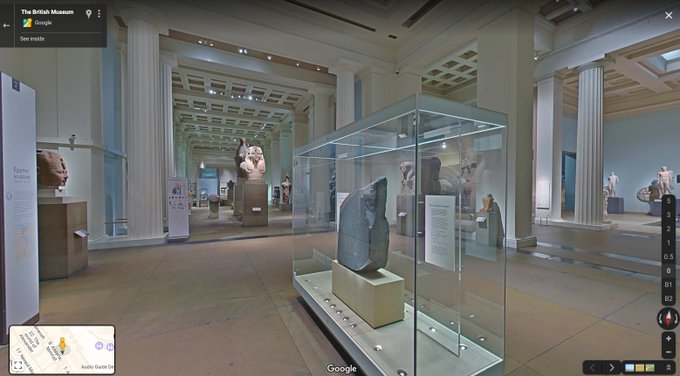Mar. 28th, 2020
Enchanting Photos of Madeira’s Ancient Fanal Forest Filled With 500-Year-Old Trees
https://mymodernmet.com/wp/wp-content/uploads/2020/03/fanal-forest-albert-dros-2.jpg
 ( Read more... )
( Read more... )
https://mymodernmet.com/wp/wp-content/uploads/2020/03/fanal-forest-albert-dros-2.jpg
 ( Read more... )
( Read more... )Digital/Virtual Tour British Museum
Mar. 28th, 2020 10:10 pmCaroline Lawrence
![[profile]](https://www.dreamwidth.org/img/silk/identity/user.png) carolinelawrenc
carolinelawrenc
https://twitter.com/CarolineLawrenc/status/1243824211191267328
Amazing! You can explore the deserted![[profile]](https://www.dreamwidth.org/img/silk/identity/user.png) britishmuseum using Google Street View.
britishmuseum using Google Street View.
Start here at the #RosettaStone:
http://tinyurl.com/wnrmspy
https://www.google.co.uk/maps/@51.5192048,-0.1274951,2a,75y,172.87h,89.26t/data=!3m6!1e1!3m4!1sFyBuFtvu6FeVvVVc5--uiw!2e0!7i13312!8i6656?hl=en

https://twitter.com/CarolineLawrenc/status/1243824211191267328
Amazing! You can explore the deserted
Start here at the #RosettaStone:
http://tinyurl.com/wnrmspy
https://www.google.co.uk/maps/@51.5192048,-0.1274951,2a,75y,172.87h,89.26t/data=!3m6!1e1!3m4!1sFyBuFtvu6FeVvVVc5--uiw!2e0!7i13312!8i6656?hl=en

Lykian History
Mar. 28th, 2020 10:48 pmhttp://lycianturkey.com/who_were_the_lycians.htm
The Lycians were an ancient people who inhabited the area of present day Turkey between the bays of Antalya and Fethiye, a compact, mountainous territory. The ancient Greeks knew and admired the Lycians, for the Lycians had solved a problem which baffled the ancient world: how to reconcile free government in the city-state with the needs of a larger political unity. The Lycians had a fierce desire for freedom and independence and this found its expression in their sense of unity and federation. The institutions of the democratic Lycian Federation (the first democratic union known) were studied and envied by most classical writers. While Greek city-states were constantly at war with each other, the Lycian cities enjoyed peace amongst themselves.
The Lycians were an important part of the Greek and Near Eastern worlds since they lived at the point where the two cultures intermingled at an important strategic juncture. The Lycians came under the twin influences of their neighbours. As a result they developed a very different style of art.
The Lycians were also one of the few non-Hellenistic nations of antiquity which could not be called ‘barbarians’. In fact, their image in antiquity was much like that of today's Swiss: a hard-working and wealthy people, neutral in world affairs but fierce in the defense of their freedom and conservative in their attachment to ancestral tradition. Lycia was the last region on the entire Mediterranean coast to be incorporated as a province in the Roman Empire and even then the Lycian Union continued to function independently. The Lycians spoke a language of their own, with their own unique alphabet, before adopting Greek around the 3rd century BC. Their many monuments, especially their beautiful tombs which embody their ancestor cult, still dot the entire landscape of the southwest coast of Turkey between the Gulf of Fethiye and Phaselis.
Besides their unique form of government, the Lycians may have had one unusual custom that the Greeks found very unfamilliar. Herodotos noted: "They have customs that resemble no one else’s. They use their mother’s name instead of their father’s. If one Lycian asks another from whom he is descended, he gives the name of his mother. And if a citizen woman should cohabit with a slave, the children are considered of free birth; but if a citizen man, even the foremost of them, has a foreign wife or mistress, the children are without honour". However, it seems that Herodotos may have been speaking of an older Lycian custom, for in Lycian and Greek inscriptions alike a man is described as the son of his father. But it may be that in private life the Lycians followed a matriarchal order while adhering to contemporary customs in public expression, such as inscriptions on tombs. So far, no one has been able to solve the question. It is noteworthy, however, that a woman was allowed to preside over the national assembly held each year at the national shrine of Lycia, Letoon. This is a reminder of the ancient matriarchal customs in Anatolia.
The Lycians’ Origins
The Lycians were most likely in origin an Anatolian people since they spoke their own Indo-European language closely related to Luwian and Hittite.
We know that the Lycians had powerful sea and land forces by the second millennium BC and had already established an independent state. The earliest historical references to the Lycians date back to the Late Bronze Age (ca 1500-1200 BC) in numerous Egyptian, Hittite and Ugaritic texts. It is known from these that the Lycians (called ‘Lukka’ in these sources) were involved in acts of piracy against Cyprus around 1400 BC, that they fought against Egypt in the ranks of the Hittites during the battle of Kadesh in 1295 BC and that they participated with the Libyans.
What is interesting is that in early records, the Lycians are referred to as 'Lukka', 'Lukki' or 'Ruw-ku', while the Lycians themselves never used these terms, instead calling themselves Trmmli (Termilae in Greek) and their country Trmmisa.
******
Lycia and the American Constitution
Alexander Hamilton
Lycia's system of representative government with privileges and obligations in direct ratio to a city's classification is the outstanding feature of the Lycian Union. Its system of elected representatives was unique in the ancient world and much admired by the ancients and later peoples. In fact, the writers of the constitution of the United States studied the Lycian federal system of government with proportional representation as a possible model for their own government.
Excerpts regrding Lycia in the Federalist Papers.
The Lycians were an ancient people who inhabited the area of present day Turkey between the bays of Antalya and Fethiye, a compact, mountainous territory. The ancient Greeks knew and admired the Lycians, for the Lycians had solved a problem which baffled the ancient world: how to reconcile free government in the city-state with the needs of a larger political unity. The Lycians had a fierce desire for freedom and independence and this found its expression in their sense of unity and federation. The institutions of the democratic Lycian Federation (the first democratic union known) were studied and envied by most classical writers. While Greek city-states were constantly at war with each other, the Lycian cities enjoyed peace amongst themselves.
The Lycians were an important part of the Greek and Near Eastern worlds since they lived at the point where the two cultures intermingled at an important strategic juncture. The Lycians came under the twin influences of their neighbours. As a result they developed a very different style of art.
The Lycians were also one of the few non-Hellenistic nations of antiquity which could not be called ‘barbarians’. In fact, their image in antiquity was much like that of today's Swiss: a hard-working and wealthy people, neutral in world affairs but fierce in the defense of their freedom and conservative in their attachment to ancestral tradition. Lycia was the last region on the entire Mediterranean coast to be incorporated as a province in the Roman Empire and even then the Lycian Union continued to function independently. The Lycians spoke a language of their own, with their own unique alphabet, before adopting Greek around the 3rd century BC. Their many monuments, especially their beautiful tombs which embody their ancestor cult, still dot the entire landscape of the southwest coast of Turkey between the Gulf of Fethiye and Phaselis.
Besides their unique form of government, the Lycians may have had one unusual custom that the Greeks found very unfamilliar. Herodotos noted: "They have customs that resemble no one else’s. They use their mother’s name instead of their father’s. If one Lycian asks another from whom he is descended, he gives the name of his mother. And if a citizen woman should cohabit with a slave, the children are considered of free birth; but if a citizen man, even the foremost of them, has a foreign wife or mistress, the children are without honour". However, it seems that Herodotos may have been speaking of an older Lycian custom, for in Lycian and Greek inscriptions alike a man is described as the son of his father. But it may be that in private life the Lycians followed a matriarchal order while adhering to contemporary customs in public expression, such as inscriptions on tombs. So far, no one has been able to solve the question. It is noteworthy, however, that a woman was allowed to preside over the national assembly held each year at the national shrine of Lycia, Letoon. This is a reminder of the ancient matriarchal customs in Anatolia.
The Lycians’ Origins
The Lycians were most likely in origin an Anatolian people since they spoke their own Indo-European language closely related to Luwian and Hittite.
We know that the Lycians had powerful sea and land forces by the second millennium BC and had already established an independent state. The earliest historical references to the Lycians date back to the Late Bronze Age (ca 1500-1200 BC) in numerous Egyptian, Hittite and Ugaritic texts. It is known from these that the Lycians (called ‘Lukka’ in these sources) were involved in acts of piracy against Cyprus around 1400 BC, that they fought against Egypt in the ranks of the Hittites during the battle of Kadesh in 1295 BC and that they participated with the Libyans.
What is interesting is that in early records, the Lycians are referred to as 'Lukka', 'Lukki' or 'Ruw-ku', while the Lycians themselves never used these terms, instead calling themselves Trmmli (Termilae in Greek) and their country Trmmisa.
******
Lycia and the American Constitution
Alexander Hamilton
Lycia's system of representative government with privileges and obligations in direct ratio to a city's classification is the outstanding feature of the Lycian Union. Its system of elected representatives was unique in the ancient world and much admired by the ancients and later peoples. In fact, the writers of the constitution of the United States studied the Lycian federal system of government with proportional representation as a possible model for their own government.
Excerpts regrding Lycia in the Federalist Papers.

